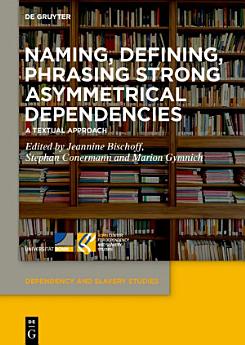Naming, Defining, Phrasing Strong Asymmetrical Dependencies: A Textual Approach
Jeannine Bischoff · Stephan Conermann · Marion Gymnich
jul 2023 · Dependency and Slavery Studies Libro 8 · Walter de Gruyter GmbH & Co KG
eBook
319
Páginas
reportLas valoraciones y las reseñas no se verifican. Más información
Información sobre este eBook
An examination of the terms used in specific historical contexts to refer to those people in a society who can be categorized as being in a position of ‘strong asymmetrical dependency’ (including slavery) provides insights into the social categories and distinctions that informed asymmetrical social interactions. In a similar vein, an analysis of historical narratives that either justify or challenge dependency is conducive to revealing how dependency may be embedded in (historical) discourses and ways of thinking. The eleven contributions in the volume approach these issues from various disciplinary vantage points, including theology, global history, Ottoman history, literary studies, and legal history. The authors address a wide range of different textual sources and historical contexts – from medieval Scandinavia and the Fatimid Empire to the history of abolition in Martinique and human rights violations in contemporary society. While the authors contribute innovative insights to ongoing discussions within their disciplines, the articles were also written with a view to the endeavor of furthering Dependency Studies as a transdisciplinary approach to the study of human societies past and present.
Acerca del autor
Jeannine Bischoff, Stephan Conermann and Marion Gymnich, University of Bonn, Germany.
Valorar este eBook
Danos tu opinión.
Información sobre cómo leer
Smartphones y tablets
Instala la aplicación Google Play Libros para Android y iPad/iPhone. Se sincroniza automáticamente con tu cuenta y te permite leer contenido online o sin conexión estés donde estés.
Ordenadores portátiles y de escritorio
Puedes usar el navegador web del ordenador para escuchar audiolibros que hayas comprado en Google Play.
eReaders y otros dispositivos
Para leer en dispositivos de tinta electrónica, como los lectores de libros electrónicos de Kobo, es necesario descargar un archivo y transferirlo al dispositivo. Sigue las instrucciones detalladas del Centro de Ayuda para transferir archivos a lectores de libros electrónicos compatibles.









